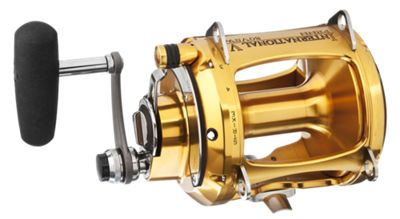The Vital Features of
Big Game Fishing Reels
Big game fishing reels have to be designed and manufactured to high standards if they are to survive the strains put on then by the powerful pelagic fish of the open ocean, and to meet the demands of the skilled anglers that have invested in them.
Here in the UK it's probably only sharks that will test big game fishing reels to anything like their full capacity, but elswhere in warmer oceans the super-fast and powerful gamefish - large billfish particularly - will test them to the limit.
Trolling is the usual way to go for these fish, and the reels best suited for this technique are of the traditional type, of which there are two basic variants - star drag reels and lever drag reels.
Let's take a look at these first...
Star-Drag Big Game Fishing Reels
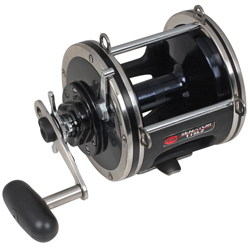 ?  Ask any fisherman to name a American-made big game reels and it's pretty much certain that Penn Reels will be at the top of his list.
These large relatively inexpensive conventional reels, typified by the BLUE SHARK series of big game fishing reels  , with take-apart frames and star drags were the reels of choice for the big game anglers of the past - Zane Grey, Philip Wylie, Ernest Hemmingway, Mike Lerner... , with take-apart frames and star drags were the reels of choice for the big game anglers of the past - Zane Grey, Philip Wylie, Ernest Hemmingway, Mike Lerner...
And of course, with modern materials they work even better now than they did then. But there's no doubt that they are outclassed by the much more sophisticated - and expensive - lever drag reels.
Lever-Drag Big Game Fishing Reels
Lever drag reels like the Penn International 50 below are the natural successors to the star drag models - but they do come at a considerable premium ...
OK, to find out just how much, take a deep breath and click on the image.
And the benefits?
- Well, that silky smooth adjustable lever drag for one
- And the two gear ratios (on some models)
- And the drag pre-set facility
- And the rock solid one-piece construction...
Reel Size Category and Line Capacity
Conventional big game fishing reels are sized according to the original Penn system, from 6/0 through 9/0 and 12/0 to a mighty 14/0. Typically, a 9/0 will hold around 675 yards of 50lb mono and a 12/0 around 800 yards of 80lb mono line.
One of the size 50 wide spool lever drag type big game fishing reels will hold around 850 yards of 50lb mono, while a narrow spool version will hold around 550 yards of 50lb mono.
Note that we're talking mono line capacities here. If you choose to use the much narrower braided line then you're going to be able to get far more line on the reel - so much so that you may well be able to use a reel of the next size down.
Gearing
Traditional reels are known as multiplier reels in Europe, because the spool turns more than once for each turn of the handle. Were that not the case, then the line retrieve rate would be fairly pathetic - particularly so when you've got a lot of line out and the effective diameter of line left on the spool is small.
Rather than just the gear ratio, what you really need to know is the amount of line recovered for one turn of the handle, but remember that when this is quoted by the manufacturer it's normally for when the spool is fully loaded. It will be much less when the fish has stripped a mile or two of line off the spool.
The other point about gear ratios is that, while a high gear is great for recovering a lightly loaded line in a hurry, it's not so good when you're trying to persuade a hard-fighting fish back towards the boat.
One Speed or Two?
Given the choice, it would always be two for me. The only downsides to a dual-speed reel are:~
- Cost
- Added mechanical complexity
But the benefits are undeniable. For example:~
- You've got an olympic-standard gamefish sprinting back towards the boat. You're going to need that high retrieve rate just to keep up with him, or he'll use that slack line to shed the hook before you know it.
- The same monster is now skulking around way beneath the boat. You can't let him rest there - his powers of recovery are faster than yours - you've got to get him moving again. Engage low gear and start pumping that rod
Adjustable Drag Systems
Ah yes, that old star drag versus lever drag thing again. Whilst in recent years star drags have improved to the point that they're almost a match for lever drags in many fishing situations, for big game fishing the lever drag beats the star drag hands down.
Not only is the lever drag smoother and more controllable than a star-drag, it can be preset to operate between free-spool and a setting just below the point at which the line will break ?- the strike drag setting. The pre-set device is normally a knurled knob - turning it clockwise increases the drag setting and vice versa. Remember that as with all multiplier reels, the more line a fish takes, the more rapidly the diameter of the remaining line on the spool reduces.
As the effect of the drag is proportional to the diameter of the spooled line, you should adjust the drag setting accordingly throughout the battle with your fish.
Adjusting the Pre-Set
You'll need a spring balance to do it properly. Here's how, and it's best done outside or with the boat in its slip:~
- With your reel mounted on a rod, tie the end of the line to the ring of a spring balance
- Now mark the spring balance with a piece of tape at the reading between 25% and 33% of the breaking strain of the main line on the reel.For example 50lb test line should have a strike drag setting of between 12?lb and 17lb, which will allow for the weak points that unavoidably occur at knotted and crimped connections.
- Now hook the spring balance to something solid?that won't give way when you put pressure on it. The last thing you want is a face-full of high-speed spring balance.
- Now give out some line so that the line is around 90o to the rod and harden-up. With the lever drag in the strike position, adjust the pre-set such that the reel gives line before the spring balance marker reaches the tape. You may need a willing accomplice to help with this.
- Now progressively turn the pre-set until the reel just starts to give line when the spring balance is tensioned to the mark on the tape. Remember this setting and you won't have to do it again.
In theory at least, if you lose the fish it won't be because your line has parted.
Line-Out Alarm
This is the ratchet, or clicker - and it's the source of the most beautiful, adrenalin rushing sound that any true big game fisherman will ever want to hear. Operated by a button or lever, it will provide that wonderful wake-up call when a fish strikes your lure and heads off to the horizon with it.
Big Game Spinning Reels
|
|
Spinning reels for big game fishing? Surely not!
But yes, with the recent advances in spinning reel design and engineering, it is now entirely possible to catch marlin and tuna up to 200lb or so on spinning outfits.
These reels are suited for both braid and mono line, and the best of them match traditional big game reels in both price and quality.
|
Caring for your Big Game Fishing Reel
Big game fishing reels are very robust and require little maintenance. However the following regime will ensure long-term reliability ...
- After a day?s fishing, always hose down the reel with fresh water, and release the pressure on the drag. A regular spray of moisture repelling lubricant will do no harm at all.
- After every few sessions lightly oil or grease the reel's external moving parts, where indicated in the manual.
- At least once a year dismantle the reel and thoroughly clean the various parts, then lubricate with light machine oil or a dab of reel lubricant, and carefully reassemble.
Looked after in this way, a big game fishing reel may well last you a lifetime.
and finally...
Any fishing reel, but especially a big game fishing reel, will be the most complex mechanical item - and likely the most expensive one - in your tackle box. As such, it will pay in the long run to choose with care and buy the best you can afford. |
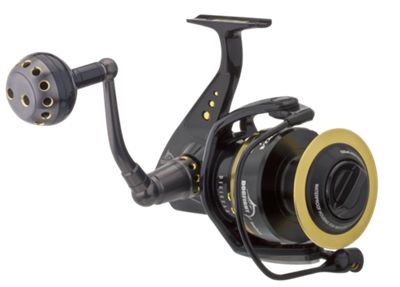
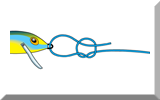

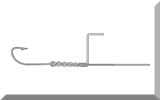

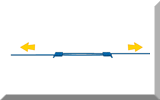
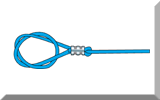
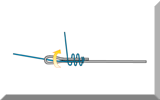
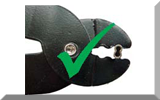
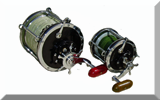
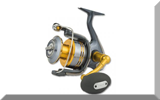
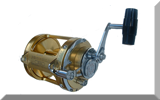
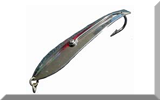
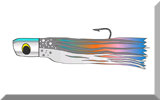
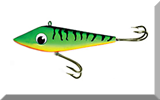
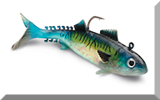
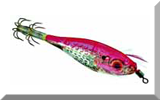
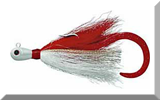
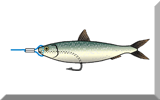
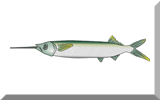
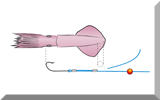
 ?
?